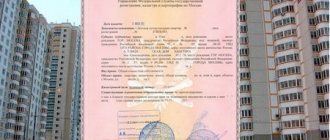A building permit is a document without which you cannot build your own cozy home. Moreover, without it, construction may be at risk (for example, you will not be able to get a loan). However, permission is not always necessary. When is it worth getting and when not? Where and with what documents should I apply to obtain a building permit? We'll tell you further.
Why do you need a building permit?
A private home is the dream of many people. Therefore, every owner of a plot of land sooner or later thinks about its construction. But not everyone knows that a permit is required to build a residential building in 2019. Yes, you need to get it, otherwise you will face administrative liability for carrying out construction work without a permit. At the same time, you may be fined several times for continuing the work.
And these are not the only reasons. For example, if you are planning to take out a loan from a bank to build a house, they simply will not give it to you without permission. If construction is taking place in a dacha, then without permission you will not be able to install water or gas.
It is prohibited to build a private house without a building permit.
In what cases is it not required?
However, not every structure you want to build on your land requires a permit. The law clearly lists these objects in paragraph 17 of Art. 51 Civil Code of the Russian Federation:
- garage, if it is located on a site not intended for business;
- on plots provided for dacha farming or gardening;
- not related to capital construction projects;
- auxiliary buildings (flock, barn, greenhouse, etc.).
If during a major renovation you do not plan to demolish walls and remodel the premises, then you also do not need to obtain permission.
The legislator made another pleasant surprise - houses built before 03/01/2015, located on plots for individual housing construction or private household plots, do not need permission to put them into operation. You can register without it.
You do not need to obtain permission to build a garage or house on a garden plot.
How to obtain permission to build a house?
When planning to build a residential building on a plot of land, you need to take into account the type of permitted use of the land. It is these indicators that determine whether a permit is required. Let's figure it out.
Individual housing construction (IHC)
The individual housing construction plot is specifically intended for the construction of a residential building, so permission must be obtained. But you can only build a house for one family and no higher than 3 floors. In this case, after construction it is necessary to register at the place of residence. If you do not start work within 3 years, you will be held accountable for misuse of land.
What are the benefits of an individual housing construction plot? Firstly, it is located on settlement lands. This means that around the site there is all the infrastructure necessary for life: roads, hospitals, schools, shops, gas, water and electricity. It is maintained by the local government. Secondly, having an exact address means you will not have problems with registration.
Is it possible to plant plants? Yes, on the individual housing construction plot you can engage in crop production, but raising animals is prohibited.
If you receive a plot of individual housing construction, you are required to build a residential building.
Garden non-profit partnership (SNT)
SNT plots are intended primarily for growing crops. Nobody obliges you to build a country house. But if you have gathered, you don’t need to get permission. Until March 1, 2020, you can put the house into operation and register it in the real estate register without it. But after that it won’t work out—the “dacha amnesty” will end.
Are there any disadvantages? Yes, definitely. Firstly, SNT is located on agricultural land. The municipality is not obliged to install infrastructure there. Therefore, when purchasing, you should think about whether you will have to install the engineering support networks yourself. Secondly, if there are networks, then without registering the house with Rosreestr, you will not be able to connect to them.
It is prohibited to build permanent houses on SNT plots.
Personal subsidiary plot (LPH)
Plots of private household plots can be located both on settlement lands and on agricultural lands. Until March 1, 2020, they also fall under the “dacha amnesty”, i.e. There is no need to obtain permits to register a constructed house. But keep in mind that if you build a permanent residential building on a private plot without permission, you risk getting a fine (Part 1, Article 9.5 of the Code of Administrative Offenses of the Russian Federation). So it's better to get it.
What are the advantages of private household plots? Firstly, you can build a residential building, but only in one case - the site is located within the boundaries of a populated area. Secondly, the tax on land is much lower than on a plot of individual housing construction. Thirdly, you can breed plants and raise animals. Well, the main plus is that no one will rush you to build a house, unlike individual housing construction.
Until 2020, it is not necessary to obtain permission to build a house on a private plot.
The procedure for recognizing ownership of unauthorized construction
Oksana Moon, Leading Legal Advisor
In accordance with Art. 222 of the Civil Code of the Russian Federation, an unauthorized construction is recognized as a residential building, other building, structure or other real estate created: on a land plot not allocated for these purposes in the manner established by law and other legal acts; without obtaining the necessary permits; with a significant violation of town planning and building codes and regulations.
As the Constitutional Court of the Russian Federation noted in its ruling dated July 3, 2007 No. 595-O-P, unauthorized construction is an offense that consists of violating the norms of land legislation governing the provision of land for construction, or urban planning norms governing design and construction; The sanction for this violation in the form of refusal to recognize the property right of the developer and the demolition of an unauthorized building by the person who carried it out or at his expense is provided for in Art. 222 of the Civil Code of the Russian Federation.
An analysis of arbitration practice shows that recently the number of cases on recognition of ownership of an unauthorized building has increased. This is due to the fact that without appropriate registration of rights to real estate, it is impossible to enter real estate into economic circulation (sell, donate, lease, make other transactions). This is where a number of difficulties arise with the circulation of unauthorized buildings and registration of ownership of them.
In this regard, it is very interesting to familiarize yourself with the position of the courts in this category of cases.
For example: Resolution of the Federal Antimonopoly Service of the Central District dated December 13, 2012 No. A68-9182/2011.
From the case materials: TulAlco LLC filed a claim with the Arbitration Court of the Tula Region against the administration of the municipal formation of the city of Tula, the Territorial Department of the Administration of the City of Tula for the Zarechensky District, and the Ministry of Property and Land Relations of the Tula Region for recognition of ownership of a completed facility - a warehouse building .
The decision of the court of first instance rejected the claims.
By the decision of the Twentieth Arbitration Court of Appeal, the decision of the court of first instance was overturned: the ownership of TulAlko LLC to the non-residential warehouse building was recognized.
Referring to the discrepancy between the conclusions of the appellate court and the actual circumstances of the case and the evidence available in the case, as well as a violation of the norms of substantive and procedural law, the defendant, the Ministry of Property and Land Relations of the Tula Region, filed a cassation appeal to the court. He asks that the decision of the Twentieth Arbitration Court of Appeal be cancelled, and that the decision of the court of first instance be upheld.
As follows from the case materials and established by the courts of first and appellate instances, according to the certificates of state registration of rights, TulAlko LLC is the owner of the unfinished construction site.
Subsequently, TulAlko LLC carried out reconstruction on the specified land plot, as a result of which the area of the facility increased to 2125.9 square meters. m. According to the documents submitted to the case file, the disputed object complies with construction, urban planning, architectural, environmental, sanitary, fire safety standards and rules and does not violate the rights of adjacent land users.
On 10/03/2011, the plaintiff applied to the territorial department of the Tula city administration for the Zarechensky district with an application to issue a permit to put into operation the disputed property.
Refusing to issue a permit to put the facility into operation, the Territorial Department of the Administration of the city of Tula, in a letter dated October 6, 2011, indicated the plaintiff’s failure to provide the documents required by Art. 55 of the Town Planning Code of the Russian Federation.
On January 25, 2012, the plaintiff applied to the Department of Urban Planning and Architecture of the Tula City Administration with applications for the issuance of construction permits and for putting the facility into operation.
The Department of Urban Planning and Architecture of the Tula City Administration, refusing to issue TulAlko LLC a building permit and to put the facility into operation, indicated that due to changes in the internal redevelopment of the building, obtaining a new building permit is not required. However, issuing a permit to put the facility into operation is not possible, since as a result of the redevelopment, the construction volume of the building has changed. The appellate court examined the evidence presented, the arguments of the parties, and gave them a correct legal assessment.
Satisfying the stated claims, the appellate court objectively referred to the actions of the plaintiff, who took measures to legalize the unauthorized construction, proof of the location of the disputed object on the land plot owned by the plaintiff, the absence of violations of the rights and legally protected interests of other persons, threats to life and health of citizens, as well as its compliance with building codes and regulations, sanitary and fire safety requirements.
In accordance with paragraph 3 of Art. 222 of the Civil Code of the Russian Federation, the right of ownership of an unauthorized construction may be recognized by the court, and in cases provided for by law - in other procedures established by law for the person who owns, has lifelong inheritable possession, and whose permanent (indefinite) use is the land plot where the construction was carried out. The right of ownership of an unauthorized structure cannot be recognized for the specified person if the preservation of the structure violates the rights and interests protected by law of other persons or creates a threat to the life and health of citizens.
According to paragraph 26 of the Resolution of the Supreme Court of the Russian Federation and the Supreme Arbitration Court of the Russian Federation dated April 29, 2010 No. 10/22 “On some issues arising in judicial practice when resolving disputes related to the protection of property rights and other property rights”, when considering claims for recognition of ownership of unauthorized construction, the courts should determine whether during its construction there were significant violations of urban planning and building codes and regulations, and whether such a construction poses a threat to the life and health of citizens. The absence of a building permit in itself cannot serve as a basis for refusing a claim for recognition of ownership of an unauthorized construction. In this case, it is necessary to take into account whether the person who created the unauthorized construction took appropriate measures to legalize it.
According to the expert opinion, the warehouse building meets the requirements of urban planning, construction, fire, sanitary-epidemiological and other norms and regulations. The facility does not pose a threat to the life and health of citizens.
The circumstances established in this case indicate that the plaintiff has ownership rights to the land plot on which the disputed object is located. The plaintiff also took measures to legalize the unauthorized reconstruction of the disputed object. At the same time, there is also no information about the existence of claims of third parties to the disputed object. As a result of the examination carried out within the framework of this case, no objective circumstances were identified that, in accordance with the law, could serve as an obstacle to the recognition of the plaintiff’s ownership of the disputed object.
Thus, the lack of a construction permit cannot serve as an obstacle to the recognition of ownership of the disputed object, and therefore the plaintiff’s claims to the Territorial Department of the Tula City Administration were rightfully satisfied.
Taking into account the above, the cassation court ruled: the decision of the Twentieth Arbitration Court of Appeal is left unchanged and the cassation appeal is not satisfied.
A person who has carried out unauthorized construction does not acquire ownership of it (clause 5 of Article 222 of the Civil Code of the Russian Federation), and all transactions will be considered void with all the ensuing negative consequences. Persons guilty of unauthorized construction or changing the architectural appearance of a structure bear administrative responsibility (Article 9.5 of the Code of Administrative Offenses of the Russian Federation). Those guilty of unauthorized construction are required to eliminate the violation and demolish the unauthorized structure at their own expense or restore the property to its original condition. However, if the unauthorized construction meets the established requirements, the provisions of paragraph 3 of Art. 222 of the Civil Code of the Russian Federation allows for the possibility of recognizing the right of ownership of an unauthorized construction in court, which makes it possible to exclude unjustified demolition.
It should be noted that the right of ownership of an unauthorized construction can be recognized by the court, and in cases provided for by law in another manner established by law, for the person who owns, has lifetime inheritable possession, and whose permanent (perpetual) use is the land plot where the construction was carried out. Otherwise, the unauthorized building is subject to demolition.
For example: Resolution of the Twelfth Arbitration Court of Appeal dated January 15, 2013 in case No. A12-15328/2012.
From the case materials: the administration of the Kirovsky district of the city of Volgograd (hereinafter referred to as the administration, plaintiff) filed a claim with the Arbitration Court of the Volgograd Region against IP Dolunts (defendant), in which he asks to oblige him to release the land plot from the unauthorized installation of a mobile facility (kiosk). The claim was satisfied by the decision of the Arbitration Court of the Volgograd Region.
Having disagreed with the decision of the court of first instance, IP Dolunts appealed to the Twelfth Arbitration Court of Appeal with a complaint in which she asks to cancel the decision of the Arbitration Court of the Volgograd Region.
Having checked the legality of the judicial act, having studied the case materials, having listened to the arguments of the parties, the appellate court does not find legal grounds for satisfying the appeal and canceling the decision of the first instance court due to the following.
As follows from the case materials, the act of checking the use of the land plot established that the land plot is used by IP Dolunts A.A. to accommodate a kiosk selling food and refrigeration equipment.
There is no information on the availability of title documents for the specified land plot in the Land Resources Committee of the Volgograd Administration.
01/23/2012 Individual Entrepreneur A. A. Dolunts was invited to a meeting of the interdepartmental commission to resolve issues regarding the demolition of unauthorized mobile buildings in the district.
IP Dolunts A.A. did not appear at the meeting of the said commission. Based on the results of consideration of the presented materials, the said commission decided to oblige IP Dolunts A.A., using its own resources and at its own expense, to demolish the unauthorized mobile facility and vacate the land plot occupied by the specified facility. The inspection report of the land plot established that the unauthorized mobile facility was not voluntarily demolished. At the second meeting, the said commission decided to forcibly demolish the unauthorized mobile facility. From the presented materials on the conduct of operational-search activities in relation to the retail facility of IP Dolunts A.A., it is clear that entrepreneurial activity is carried out at the kiosk.
The above circumstances served as the basis for the administration to file this claim in court.
The court of first instance, partially satisfying the claims, rightfully pointed out that the defendant did not provide evidence of the use of the disputed land plot legally.
According to paragraph 1 of Art. 8 of the Civil Code of the Russian Federation, civil rights and obligations arise from the grounds provided for by law and other legal acts, as well as from the actions of citizens and legal entities, which, although not provided for by law or such acts, but due to the general principles and meaning of civil legislation give rise to civil rights and responsibilities.
In accordance with clause 10 of the Federal Law “On the implementation of the Land Code of the Russian Federation” dated October 25, 2001 No. 137-FZ, the disposal of land plots specified in Art. 3.1 of this Federal Law is carried out after state registration of ownership of them. The lack of state registration of ownership of land plots, state ownership of which is not demarcated, is not an obstacle to their disposal.
The disposal of land plots, the state ownership of which is not demarcated, is carried out by local government bodies. In accordance with Art. 608 of the Civil Code of the Russian Federation, the right to lease property belongs to its owner. Lessors can also be persons authorized by law or the owner to lease property.
According to paragraph 1 of Art. 72 of the Land Code of the Russian Federation, municipal land control over the use of land on the territory of a municipal entity is carried out by local government bodies or bodies authorized by them.
By virtue of clause 3 of Art. 76 of the Land Code of the Russian Federation, bringing land plots into a usable condition in case of clutter, other types of damage, unauthorized occupation, demolition of buildings, structures, structures during unauthorized occupation of land plots or unauthorized construction is carried out by legal entities and citizens guilty of these land offenses, or for their account.
In accordance with Art. 301 of the Civil Code of the Russian Federation, the owner has the right to reclaim his property from someone else’s illegal possession.
Art. 304 of the Civil Code of the Russian Federation establishes that the owner may demand the elimination of any violations of his rights, even if these violations were not associated with deprivation of possession.
In accordance with Art. 305 of the Civil Code of the Russian Federation, rights provided for in Art. 301-304 of the Civil Code of the Russian Federation, also belong to a person who, although not the owner, owns the property by the right of lifelong inheritable ownership, economic management, operational management or on another basis provided for by law or agreement. This person has the right to defend his possession also against the owner.
In this case, the administration of the municipality, by virtue of law, is vested with the rights of the owner in relation to the disputed site.
By virtue of Art. 60 of the Land Code of the Russian Federation, the violated right to a land plot is subject to restoration in the event of unauthorized occupation of the land plot.
Part 2 art. 62 of the Land Code of the Russian Federation provides that, on the basis of a court decision, a person guilty of violating the rights of land owners may be forced to fulfill the obligation in kind, including by demolishing illegally erected buildings, structures, structures, eliminating other land offenses and fulfilling obligations that have arisen .
The fact that the defendant's property is located on the disputed land plot is not disputed by the defendant.
According to Art. 65 of the Arbitration Procedure Code of the Russian Federation, each person participating in the case must prove the circumstances to which he refers as the basis for his claims and objections, otherwise bearing the burden of negative consequences for himself.
Evidence of the construction of real estate objects on the disputed land plot in the manner prescribed by current legislation, the location of real estate objects belonging to the defendant on the land plot, was not presented to the court.
In the case materials, there are no documents on the allocation of a land plot for the construction of the facility, and there is also no information on the issuance by the authorized body of the municipality of a permit for the construction and commissioning of the facility, as prescribed by Art. 55 of the Town Planning Code of the Russian Federation.
Evidence of the conclusion of another lease agreement with the defendant or the acquisition by the defendant of other rights to the land plot on which the kiosk is located was not presented in the case materials.
Thus, the court of first instance reasonably satisfied the administration’s claims, obliging IP Dolunts to demolish the kiosk.
The following essential conditions for the emergence of ownership rights to unauthorized construction can be identified:
- Availability of properly registered rights to the land plot on which the unauthorized construction is located, compliance with the intended purpose and permitted use of the land plot, as well as the red lines established by the planning projects;
- Availability of a construction permit, i.e. a document issued to the customer (developer) by local government bodies and certifying the owner’s right to develop the land plot, construct, reconstruct a building, structure and structure;
- Respect for the rights and legitimate interests of other persons;
- There is no threat to the life or health of citizens (these conditions must be confirmed by permits from sanitary inspection, fire protection, architectural or construction control authorities);
- If the land plot where the construction was carried out is owned, inherited for life, or is permanently (indefinitely) used by another person, then the ownership right is transferred to him subject to compensation to the person who carried out the unauthorized construction for the costs of its construction (Article 222 of the Civil Code of the Russian Federation) ;
- In addition, during the construction or reconstruction of a real estate property in accordance with Articles 1, 2, 8, 9, 30, 36, 44, 47, 48, 51, 55 of the Town Planning Code of the Russian Federation, evidence of construction is required based on territorial planning documents and land use and development rules, as well as carrying out urban planning activities in compliance with territorial safety requirements, engineering and technical requirements, civil defense requirements, ensuring the prevention of emergencies of a natural and man-made nature, carrying out urban planning activities in compliance with environmental protection and environmental safety requirements, in the presence of design documentation drawn up in the prescribed manner , with obtaining permits for construction and commissioning of real estate, confirming the implementation of development in compliance with urban planning and building codes, regulations and safety rules;
- An important factor for the court to recognize the right of ownership of an unauthorized structure is the plaintiff’s taking measures to legalize the illegal structure (example of Resolution of the Federal Antimonopoly Service of the Central District dated December 13, 2012 No. A68-9182/2011).
Only if all the above conditions are met is it possible to recognize ownership of an unauthorized construction. There are two ways to legalize unauthorized construction:
- Out of court, i.e. collect all the necessary documents (construction permit and other documentation as for an unbuilt object), obtain the corresponding act of the State Commission and register ownership. It should be recognized that this process is very labor-intensive and long. The likelihood of a favorable outcome for the owner of an unauthorized building is also low, if only because the object has already been built. A significant disadvantage of this method of legalization is that the legislation does not provide a clear list of documents that must be submitted to the registration authorities to formalize ownership rights to a newly constructed facility. Yes, Art. 25 of the Federal Law of July 21, 1997 No. 93-FZ “On state registration of rights to real estate and transactions with it” is of a framework nature and states that ownership of a newly created real estate object is registered on the basis of documents confirming the fact of its creation , as well as the right to use a land plot to create this property;
- Recognition of ownership of an unauthorized building in court. There are two cases to highlight here:
a) for a person who has carried out an unauthorized construction on a land plot that does not belong to him, provided that this plot will be provided to this person in the prescribed manner for the erected structure.
For example: if a land plot is in municipal or state ownership, confirmation may be a draft resolution on the provision of a site for the operation of a building or a letter from the body authorized to manage land plots, which will clearly express the intention to transfer the land plot. The procedure for providing such sites for construction is determined by Art. 30-33 Land Code of the Russian Federation. At the same time, the land plot should not belong to anyone on the right of private ownership, lifelong inheritable possession or permanent (indefinite) use.
If the land plot is the private property of an individual or legal entity, then the ownership of an unauthorized real estate object can be recognized by the one who built it only after the land plot is seized from the owner (Article 284 of the Civil Code of the Russian Federation) or an agreement will be concluded with the owner on the acquisition by the developer of the right to the site.
b) a person in ownership, lifelong inheritable possession, permanent (perpetual) use of the land plot where the construction was carried out, who is obliged to compensate the person who carried out the construction for the costs of its construction in the amount determined by the court. Case from practice: Decision of the Novomoskovsk City Court of the Tula Region dated September 27, 2010.
From the case materials: the plaintiff (V.A. Mironov) filed a lawsuit against A.V. Mironov and T.L. Mironova for the recovery of costs associated with the construction of non-residential premises, citing the fact that, in accordance with the resolution of the head of the municipal education, his son Mironov A.V. was provided with a land plot on the right of indefinite (permanent) use for entrepreneurial activity (for the construction of a complex for the trade of building materials). Since his son A.V. Mironov did not have funds, he decided to build a store on the specified plot of land in order to subsequently register this store for himself. A contract for the construction of non-residential premises was concluded between him and LLC “...” (construction company). Based on clause 6 of this agreement, payment for the work performed was made by him. Based on the submitted certificates of completion of work and receipts for cash receipts, the plaintiff paid for the construction of a non-residential building. In addition, he incurred other expenses for the construction of this building, which are confirmed by sales receipts, acts, invoices, contracts, and receipts attached to the case. The total cost of building the store was (...). He had to borrow part of this money from his friends.
According to the court decision, after the divorce, the common joint property of the spouses was divided, A.V. Mironov and T.L. Mironova were allocated ownership of 1/2 share each of a non-residential building - an industrial goods store. By the appeal ruling (...) of the city court, the decision of the magistrate was left unchanged. The plaintiff believes that since he carried out an unauthorized construction, namely, built this store on a plot of land that does not belong to him, and the ownership rights to this building are recognized by A.V. Mironov and T.L. Mironova, then they are in accordance from Art. 222 of the Civil Code of the Russian Federation must reimburse him for the costs of constructing this building.
The court, having heard the parties and examined the case materials, considers that the claims of V.A. Mironov are subject to satisfaction on the following grounds. The head of the Department of Architecture and Urban Planning issued A.V. Mironov a permit to construct the property. Mironov A.V. was issued permission to commission the constructed facility.
Mironov A.V. received a certificate of state registration of ownership of a non-residential building - an industrial goods store. The court found that the construction of the specified non-residential detached building and construction costs were carried out by the plaintiff V. A. Mironov. These circumstances are not denied by the defendants in the case and are confirmed by the following evidence: a contract for the construction of non-residential premises, testimony of witnesses FULL NAME11, FULL NAME10, FULL NAME9, FULL NAME8, FULL NAME7, FULL NAME6.
Thus, V.A. Mironov, being a developer, carried out an unauthorized construction on a land plot, which was presented with the right of indefinite (permanent) use to his son A.V. Mironov. The right of ownership to an unauthorized construction is recognized according to the rules of Art. 222 of the Civil Code of the Russian Federation.
Due to the fact that the ownership of a separate building, in equal shares, 1/2 share each, was recognized for A.V. Mironov and T.L. Mironova, they are obliged to compensate V.A. Mironov who carried out the construction of this building, construction costs in equal shares.
The court found that V.A. Mironov incurred expenses for the construction of a non-residential building - an industrial goods store, in the amount of (...). In this regard, the claims of plaintiff V.A. Mironov must be satisfied. In his favor, it is necessary to recover from Mironov A.V. and Mironova T.L. the costs of constructing the said building in equal shares, that is, in the amount of (...) from each.
It should be noted: at the time the court considers a claim for recognition of ownership of an unauthorized building, the provision of a land plot for it is an optional condition. A written promise from the owner to provide a plot of land for the operation of the building in the future is sufficient.
In the process of legalizing an unauthorized building in court, the following must be attached to the statement of claim for recognition of ownership rights to it:
- documents confirming the fact that the plaintiff erected an unauthorized structure (documents confirming construction costs, contract agreements and acts of acceptance of construction work);
- documents indicating that the rights to this object do not belong to third parties (extract from the Unified State Register of Rights to Real Estate and Transactions with It);
- documents containing a technical description of the unauthorized construction and its address (extract from the Unified State Register of Urban Development Objects);
- documents confirming the compliance of the erected structure with sanitary and epidemiological, fire safety, technical, environmental standards (environmental audit conclusions, documents from state environmental protection bodies, conclusion of a technical inspection);
- other documents confirming that the preservation of unauthorized construction does not violate the rights and legitimate interests of third parties (letters from owners of neighboring land plots).
It should be noted that this list of documents is approximate. Depending on the specific situation, additional documents may be required. For example: in accordance with paragraph 1 of Art. 218 of the Civil Code of the Russian Federation, the right of ownership to a new thing manufactured or created by a person for himself is acquired by that person. Consequently, when considering a case in court, the interested party must additionally submit documents confirming that other persons did not participate in the creation of the object with the goal of constructing the object for themselves and, accordingly, acquiring ownership of the object (receipts, estimates and other documents). If this circumstance is not proven in court, then, most likely, the court will refuse to recognize the ownership right to unauthorized construction of real estate.
The question arises: who will be the proper defendant in this category of cases? There are two possible cases here:
- If an unauthorized structure is erected on a land plot that does not belong to the developer, but the necessary permits have been obtained for its creation, a claim for recognition of ownership of the unauthorized structure must be filed by the owner of the land plot. The defendant in this claim will be the developer;
- If an unauthorized building is erected without obtaining the appropriate permits on a site that belongs to the developer, then the claim should be filed with the local government body on whose territory the unauthorized building is located.
A court decision recognizing ownership of an unauthorized construction that has entered into legal force is the basis for state registration of rights to real estate. However, recognition of the right of ownership of an unauthorized construction does not indicate the impossibility of an interested party subsequently challenging the right of ownership of this property on other grounds.
Thus, the method of legalizing rights to unauthorized construction through the court is considered the most preferable, since the appeal procedure is clearly regulated and leaves a wide field of activity for appealing decisions already made, and, importantly, there is no need to contact various government bodies.
It is important to note that a plot of land occupied by unauthorized construction can only be used for its intended purpose. If this norm is violated, then even in court it will be impossible to recognize ownership of the building. Otherwise, this situation will contradict the Land Code (Article 8 of the Land Code of the Russian Federation).
Case from practice: Appeal ruling of the Supreme Court of the Republic of Tyva dated October 23, 2012.
From the case materials: FSBEI HPE "TyvGU" filed a lawsuit against E.V. Ondar for the demolition of the unauthorized building, pointing out that as a result of an inspection carried out by the Federal Property Management Agency in the Republic of Tyva, violations were identified in the use of federal land plots assigned to the university. The defendant, without completing design estimates and permitting documentation in the prescribed manner, without obtaining the necessary permits, unauthorizedly carried out the construction of a residential building and installed a wooden fence along the border on a plot of land not allocated for these purposes. This land plot is federal property and is assigned to the university on the right of permanent (indefinite) use on the basis of a certificate of state registration of rights. The plaintiff asked to recognize the residential building and wooden fence as unauthorized construction and to oblige the defendant to demolish the unauthorized structure.
The claim was satisfied by the decision of the court of first instance. Ondar E.V. did not agree with the court’s decision and filed an appeal, pointing out that the court’s conclusions set out in the decision do not correspond to the circumstances of the case.
After listening to the explanations of the defendant Ondar E.V., checking the case materials, discussing the arguments of the appeal, the judicial panel comes to the following: According to the certificate of state registration of rights, issued by the Office of the Federal Service for State Registration, Cadastre and Cartography for the Republic of Tyva, the land plot is assigned to the right of permanent (unlimited) use for the Federal State Budgetary Educational Institution of Higher Professional Education "TyvGU"; Permitted use of the land plot is for a dormitory.
The fact that the defendant erected a residential building and a fence on the land plot is confirmed by the inspection report, and is not disputed by the defendant. The Deputy Head of the Department of Architecture and Urban Planning of the City Hall issued a conclusion that the house was built by the defendant in violation of land and urban planning legislation from old wooden beams. The technical characteristics of the house do not meet the requirements of SNiP, and it cannot be recognized as a residential premises (house).
Having established that the defendant erected buildings on a land plot that was not allocated for these purposes in the manner prescribed by law and other legal acts, without obtaining the necessary permits and without complying with town planning and building codes and regulations, the court reasonably granted the claim and ordered the defendant to demolish the unauthorized building for own funds account.
It should be borne in mind that an unauthorized building is not property legally owned by the testator, therefore, it cannot be included in the inheritance mass. However, this does not deprive the heirs of the right to demand recognition of their ownership of the unauthorized construction (only if the heirs by inheritance have received the right of ownership or the right of lifelong inheritable possession of the land plot on which the construction was carried out, subject to the conditions established by Art. 222 of the Civil Code of the Russian Federation).
An important fact is that it is currently possible to recognize the right of ownership of an unauthorized structure due to acquisitive prescription - a person who is not the owner of the property, but who conscientiously, openly and continuously owns his own real estate for fifteen years or other property for five years, acquires ownership of this property (clause 12 of the Information Letter of the Presidium of the Supreme Arbitration Court of the Russian Federation dated December 9, 2010 No. 143).
It should also be remembered: redevelopment and reconstruction are not grounds for filing a claim for the demolition of a property as an object of unauthorized construction. However, persons whose property rights or legal possession are violated by the preservation of such objects may apply to the court to eliminate the violation of rights that is not associated with deprivation of possession (Article 304 of the Civil Code of the Russian Federation). If such an object, created as a result of redevelopment or re-equipment, creates a threat to the life and health of citizens, interested parties have the right, on the basis of clause 1 of Art. 1065 of the Civil Code of the Russian Federation, file a lawsuit to prohibit the operation of this facility.
Where can I get permission?
A building permit is issued by the local government body of the district in which the land plot is located. This is where you need to submit your application and documents.
You can submit documents in person, through a representative or a multifunctional center (MFC). If you are submitting through a representative, attach a notarized power of attorney.
Deadline for issuing a building permit
You will receive a building permit 10 days after submitting your application. A permit to build a house is valid for 10 years. As soon as you receive it, you are required to provide the local administration with documents on the number of storeys, area of the house, engineering surveys, etc. You have 10 days to do this.
Submit an application and receive a building permit in 10 days.
What documents are needed to obtain a building permit?
The list of documents depends on the site on which you plan to build a house.
Documents for individual housing construction:
- statement;
- documents confirming land ownership;
- urban planning plan of the site;
- passport of a citizen of the Russian Federation;
- a schematic plan of a plot of land with a designated construction site;
- design documentation;
- positive expert opinion on the design documentation of a capital construction project (if necessary).
Project documentation is not needed when constructing a building of up to 3 floors for one family.
To obtain permission to build a house located on a private plot, you need an application and three documents: a title document, a town planning plan and a planning organization diagram for the land plot.
What to do if you don't have a town plan? You can also get it from the local administration - just write an application for its issuance. You will receive it within 30 days. You don't need to pay anything.
Application for a building permit
You can obtain an application form from an MFC specialist, electronically through the State Services portal or on the official website of the local administration.
What is samostroy
According to paragraph 1 of Article 222 of the Civil Code of the Russian Federation, a building that meets one of the following conditions is considered an unauthorized construction:
- if construction is carried out on land that is not registered for the construction of buildings in the manner prescribed by law;
- if the building was built without permits accompanying this process;
- if construction was carried out in violation of technical standards.
Once the structure is erected, the owner will not receive ownership rights. This means that such a building cannot be the subject of sale, exchange, or donation.
According to the rules , a squatter building that is subject to demolition is liquidated at the expense of the person who built it . But there are exceptions, in accordance with paragraph 3 of Article 222 of the Civil Code of the Russian Federation.
Validity period of the building permit
As already mentioned, a building permit is valid for 10 years. If you do not have time to build a house within the specified period, then you must submit an application for extension 60 days before its completion (Clause 20, Article 51 of the Civil Code of the Russian Federation). You must also submit an application to your local administration.
What to do if it's overdue?
Even if you did not submit an application 60 days before the building permit expires, you cannot be denied an extension for this reason. There is only one reason - you are already building a house. Even if you just poured the foundation, that also counts.
This reason is stated in paragraph 20 of Art. 51 of the Civil Code of the Russian Federation - if construction, reconstruction or major repairs of a residential building have begun, refusal to extend the validity period of the permit is unlawful. The court adheres to the same opinion (for example, in the Resolution of the Federal Antimonopoly Service of the Moscow Region dated November 28, 2007 No. KA-A41/11901-07 in case No. A41-K2-3411/07).
If you are building a house, but the permit has expired, you have no right to refuse an extension.
Arbitrage practice
One lawsuit resulted in the denial of a claim for recognition of ownership. The plaintiff had his own parking lot - a non-residential building with a metal fence. There was no building permit. But the facility was built at the plaintiff’s own expense. The land plot was leased, and the lessor refused to formalize the land acquisition.
The court decided to refuse, justifying it by the fact that the lease agreement had not passed state registration, and therefore was declared invalid (FAS PO dated 02/14/2006 N A55-4426/05-14).
Why can they refuse a building permit and what to do?
After submitting an application for a building permit, the administration will check all submitted documents. You will be refused if:
- you have not submitted all documents;
- the site is not intended for the construction of a permanent house;
- the development plan does not meet the minimum requirements.
In the first case, you just need to deliver the necessary papers, in the second - try to transfer the land from agricultural use to land in populated areas. But this is problematic because the boundaries of settlements are strictly defined. In the third case, it is necessary to properly draw up a development plan. There will be no difficulties with this if you contact an architect.
A refusal to issue a permit to build a house can be appealed through the court.
Extrajudicial demolition
According to paragraph 2 of Article 222 of the Civil Code of the Russian Federation, the demolition of a building is carried out at the expense of the one who erected it. Resolution 10/22 states that the following can ask for the court to declare a building illegal, and therefore demand demolition:
- owner of the land plot;
- the subject to whom the land was transferred as a gift, etc.;
- a citizen whose rights have been violated due to the construction of the facility;
- prosecutor;
- authorized body;
- legal owner of the plot.
You don’t have the document at hand, but you need the number urgently? See how to find out the TIN from your passport online. The federal law on veterans, as amended, is possible.
The demolition of an unauthorized structure out of court is carried out in accordance with paragraph 4 of Article 222 of the Civil Code of the Russian Federation. Demolition of unauthorized buildings occurs on the basis of certain conditions:
- the land plot is not intended for construction;
- the site is located in a special zone;
- the plot is located at the location where utility networks are drained.
The procedure for making a decision on demolition:
- Consideration of the issue by the local administration.
- Making a decision on demolition.
- Sending the decision to the citizen who built the facility.
- 1 year is given for demolition.
It happens that it is not known who built the object, then:
- Information about the demolition request is published.
- Information about the demolition is published on the compulsory medical insurance website.
- Creation of an information board with information about the demolition and installation of it within the site.
- If a builder is not found, then 2 months after the publication of messages, the local administration can independently demolish the object.
If necessary, the demolition decision can be appealed in court.









